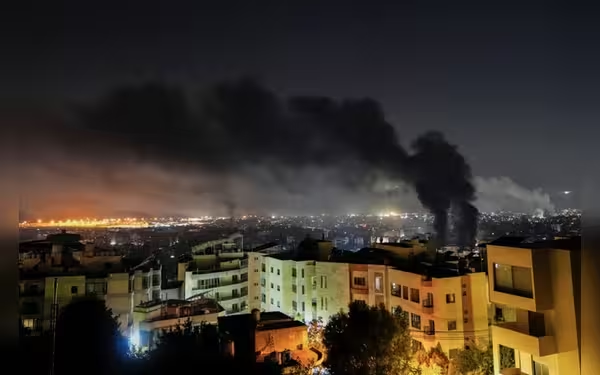Saturday, November 16, 2024 03:22 PM
Israeli Airstrikes Target Beirut, Escalating Conflict with Hezbollah
- Israeli airstrikes devastate Beirut's southern suburbs.
- Hezbollah's facilities targeted, raising civilian safety concerns.
- Iran condemns strikes as a serious escalation in conflict.
 Image Credits: arabnewspk
Image Credits: arabnewspkIsraeli airstrikes on Beirut escalate conflict with Hezbollah, causing civilian casualties and raising international concerns.
In a dramatic escalation of the ongoing conflict in the Middle East, a series of Israeli airstrikes targeted Beirut’s southern suburbs on Friday evening. The strikes, which occurred in the Haret Hreik neighborhood, resulted in the destruction of a residential block and sent shockwaves throughout the Lebanese capital. Witnesses reported that the blasts rattled windows and sent thick plumes of dark smoke into the sky, creating an atmosphere of panic among residents.
The Israeli army claimed that these "precise strikes" were aimed at the central headquarters of Hezbollah, an Iran-backed militant group. According to reports, the targeted facilities were believed to be located beneath residential buildings, raising serious concerns about civilian safety. Lebanon’s Health Minister, Firas Abiad, confirmed that "some of the targeted buildings were inhabited," highlighting the tragic consequences of the attack. At least two individuals have been reported dead, with over 50 others injured, including three in critical condition.
As the situation unfolded, paramedics from Hezbollah’s Islamic Health Authority rushed to the scene, joined by relatives of the affected residents. Many people in the southern suburbs fled in their cars towards Beirut and Mount Lebanon, seeking safety amid the chaos. The Lebanese state-run National News Agency reported that six tall buildings in Haret Hreik were reduced to rubble, marking this as one of the most significant blasts to hit the capital in the past year.
Israeli media indicated that the military utilized F-35 aircraft and dropped approximately 2,000 tons of explosives in an effort to target Hezbollah’s secretary-general, Hassan Nasrallah, who was suspected to be in a bunker beneath the buildings. Initial reports suggested that Nasrallah may have been "harmed," but subsequent assessments indicated he was unharmed, according to Iranian news sources.
The Iranian embassy in Beirut condemned the Israeli strikes, labeling them a "serious escalation that changes the rules of the game." They asserted that the Israeli regime had committed a "bloody massacre" by targeting heavily populated residential neighborhoods. Analysts have expressed concern that this attack signifies a shift in Israel’s military strategy, moving away from traditional wartime norms and ethical considerations.
Experts believe that the scale of destruction reflects Israel’s willingness to disregard international law principles, raising alarms about the potential for further conflict. Rafe Jabari, a researcher on Arab political sociology, noted that such actions could provoke more instability in the region rather than lead to lasting peace. He emphasized that the continuation of military actions is likely to escalate tensions and fuel future conflicts.
Political analysts have pointed out that by targeting Nasrallah, Israel has broken established conflict rules, which could have significant ramifications for the ongoing war. Nader Ezzedine, a Beirut-based analyst, remarked that whether Nasrallah survives or not, the strike will alter the dynamics of the conflict. He suggested that the absence of rules in this war could lead to even more violence and destruction.
As the situation continues to develop, many are left wondering about the future of the region. The recent airstrikes have not only intensified the conflict but have also raised questions about the effectiveness of military solutions in achieving peace. With both sides seemingly entrenched in their positions, the prospect of a diplomatic resolution appears increasingly distant. The international community watches closely, hoping for a de-escalation of tensions and a return to dialogue, but the path forward remains fraught with challenges.













